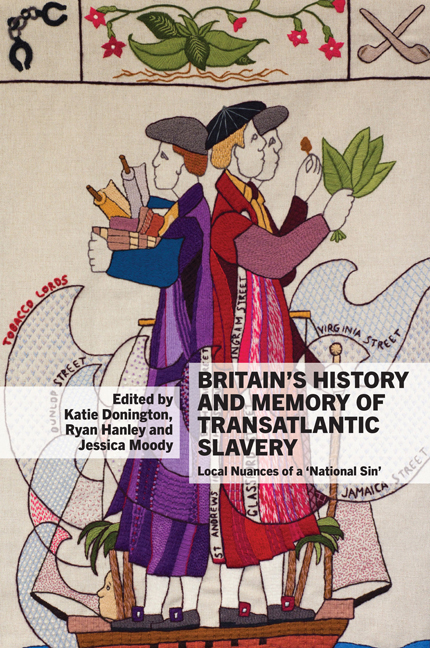Book contents
- Frontmatter
- Contents
- List of Illustrations
- Acknowledgements
- Contributors
- Introduction
- I Little Britain's History of Slavery
- II Little Britain's Memory of Slavery
- 6 Whose Memories? Edward Long and the Work of Re-Remembering
- 7 Liverpool's Local Tints: Drowning Memory and ‘Maritimising’ Slavery in a Seaport City
- 8 Local Roots/Global Routes: Slavery, Memory and Identity in Hackney
- 9 Multidirectional Memory, Many-Headed Hydras and Glasgow
- 10 Making Museum Narratives of Slavery and Anti-Slavery in Olney
- Afterword
- Selected Bibliography
- Index
- Plate section
10 - Making Museum Narratives of Slavery and Anti-Slavery in Olney
from II - Little Britain's Memory of Slavery
- Frontmatter
- Contents
- List of Illustrations
- Acknowledgements
- Contributors
- Introduction
- I Little Britain's History of Slavery
- II Little Britain's Memory of Slavery
- 6 Whose Memories? Edward Long and the Work of Re-Remembering
- 7 Liverpool's Local Tints: Drowning Memory and ‘Maritimising’ Slavery in a Seaport City
- 8 Local Roots/Global Routes: Slavery, Memory and Identity in Hackney
- 9 Multidirectional Memory, Many-Headed Hydras and Glasgow
- 10 Making Museum Narratives of Slavery and Anti-Slavery in Olney
- Afterword
- Selected Bibliography
- Index
- Plate section
Summary
Introduction
Charles Forsdick argues that there are plural memories of transatlantic slavery and ‘it is essential to study the different ways they came about.’ This is not only pertinent with regard to differing national traditions of remembrance across Europe, Africa and the Americas but also regarding the differences within nations in specific localities. Further, it is also essential to study the ways memories of transatlantic slavery change over time in localities and how these local remembrances intersect with or challenge emerging national and international discourses. This turn to complexity will illuminate the nuances and textures of the memory of slavery, highlighting the instability and malleability of representations of this past. This chapter takes up this challenge for complexity and charts the way narratives of slavery and anti-slavery have been constructed in a small independent museum with a specifically ‘local’ focus. The Cowper and Newton Museum (hereafter the CNM) is located in Olney, a town in the north of rural Buckinghamshire that sits on the banks of the River Ouse, surrounded by tranquil countryside and farmland. The town is popular with tourists, who stroll around the twisting lanes, watch the annual pancake race, or purchase examples of the famous Olney lace made in the town since the 1560s. It is a quiet place with ivy-covered cottages and quaint inns inhabited by a predominantly white, retired population. It is not necessarily a place where one would expect to find memories of the transatlantic slave trade yet, in the eighteenth century, Olney was home to two abolitionists: William Cowper and John Newton. Cowper was a poet who wrote a number of anti-slavery ballads such as ‘The Negro's Complaint’ and ‘Sweet Meat Has Sour Sauce,’ and Newton was an ex-slave trader-turned-abolitionist and evangelical curate who developed a spiritual friendship with William Wilberforce. Cowper's home, which stands in a prominent position in Olney Marketplace, is now the CNM – an independent historic house museum, established in 1900 and managed by volunteers from the community. The museum tells the story of the men's lives, including their friendship, involvement with abolitionism and Newton's involvement with the slave trade itself. This chapter considers how the centenary (1907) and bicentenary (2007) of the abolition of the slave trade were constructed and represented in the CNM.
- Type
- Chapter
- Information
- Britain's History and Memory of Transatlantic SlaveryLocal Nuances of a 'National Sin', pp. 216 - 236Publisher: Liverpool University PressPrint publication year: 2016



